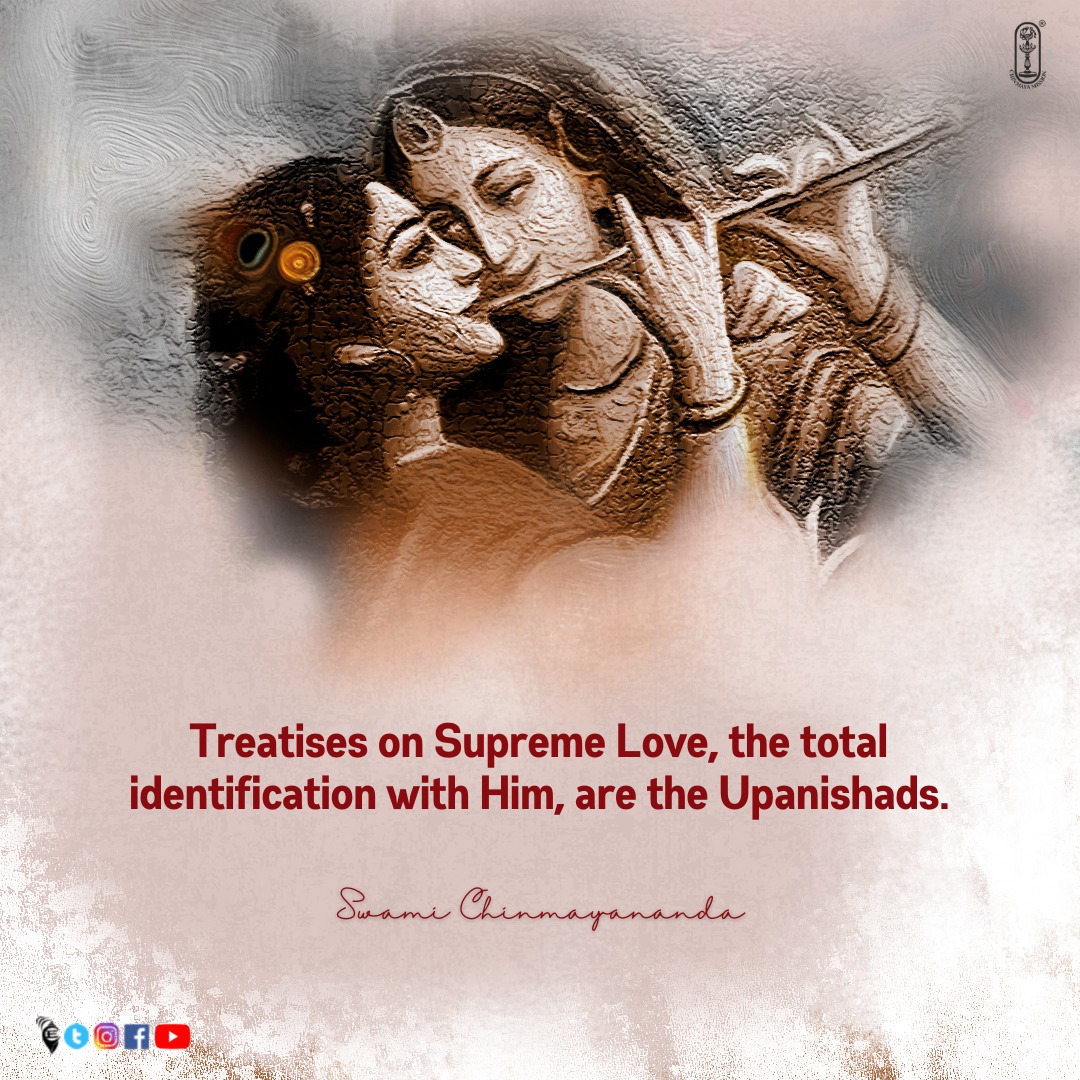Practice of *Brahmacharyam (*Self- Restraint ) : 22.5 - Swami Sivananda.
================================================================
Tueday, 12 Sep 2023 05:30.
22.5. Beauty lies in imagination. The story of Hemachuda
================================================================
5. Beauty lies in imagination. The story of Hemachuda
There was a king named Muktachuda in olden times. He ruled the kingdom of Dasarna. He had two sons, Hemachuda and Manichuda. They both were very handsome and virtuous. They had good behaviour and conduct. They were also very proficient in all the arts. They both went to the mountain Sahya with attendants and weapons for hunting. They shot many tigers and wild animals. All of a sudden there was a terrible sandstorm. Immense darkness prevailed. One could not see the other person.
Hemachuda somehow managed to reach the hermitage of a sage, which was full of fruit trees. He saw in the Ashram a beautiful maiden. He was quite astonished to see a fearless girl in that solitary forest. He asked the maiden, “Who are you? Who is your father? Why are you alone here? How did you develop this courage?” She replied politely, “Welcome, O prince! Take your seat. Take a little rest. You seem to be much tired. Kindly take these fruits and nuts. I shall relate my story.” The prince ate those fruits and nuts and rested for a while.
The girl then began: “O prince! Harken to my story with rapt attention. I am the God-child of sage Vyaghrapada who is adored by all, who has conquered the world by his severe austerities, and who has attained liberation. My name is Hemalekha. Vidyutprabha, celestial nymph of matchless beauty and indescribable splendour, one day came to the river Veena for bathing. Sushena, the king of the Vengas, also came there. Sushena was captivated by the enchanting beauty of Vidyutprabha. The celestial nymph was also infatuated with the handsome figure of King Sushena. Sushena pleaded his love to Vidyutprabha. She responded. The king spent some time with her. Afterwards he returned to his capital.
“Vidyutprabha soon brought forth a child.” She left the child there as she was afraid of her husband and went to her place. I am that child. Vyaghrapada came to the river for his daily ablutions. He saw me and took pity on me. He brought me up like a mother. I regard him as my father. I serve him with reverence. Through his grace I have become fearless here. My father will return presently. Please wait a little. Pay your respects to him and obtain his blessings.” The intelligent girl understood the heart of the prince and said: “O prince! Do not get disheartened. You can gratify your desire. My father will grant your desire.”
Immediately, the sage Vyaghrapada entered with flowers for worship. The prince got up and prostrated before the sage. The sage understood that the prince was in love with the girl. He gave Hemalekha in marriage to the prince. The prince returned with her to his city. His father was very much delighted. He celebrated their marriage with pomp and splendour.
The prince loved Hemalekha immensely. He was very much attached to her. But he noticed that she was rather indifferent to sensual pleasures. He asked her one day: “O dear Hemalekha, what is the matter with you? I am very much attached to you. Why do you not reciprocate my love? Nothing seems to have any effect on you. You are dispassionate. How can I enjoy when you have such an attitude of mind? You always sit with closed eyes like a statue. You do not laugh, play and joke with me. Kindly speak out your heart. Be frank.”
Hemalekha replied respectfully: “O prince! Hear me. What is love? What is dislike? As this is not clear to my mind, I am always reflecting over it. I have come to no definite conclusion. Please enlighten me on this point. I entreat you.”
Hemachuda replied with a smile: “It is true that women possess an innocent mind. Even animals understand what is like and dislike. We see that they like pleasing things and dislike unpleasant objects. Beauty gives us pleasure; ugliness gives us pain. Why do you waste your time daily on this?”
Hemalekha replied: “It is true I that women have no independent power of thinking. So, is it not your duty to clear my doubts? If you throw light, I will leave off thinking and be attached to you always. O prince! You said that like and dislike or love and hatred arise out of objects which give us pleasure and pain. But the same object gives us pleasure and pain on account of time, circumstances and environments. What is your decision then? Kindly give me your definite answer. Fire is very pleasant in winter, but in summer it is very terrible. You cannot go near the fire. The same fire gives pleasure in cold countries and pain in hot countries. The quantity of fire gives us different results. Similar is the case with wealth, wife, son, mother and so on. These induce positive sufferings and misery. Why is it that your father Muktachuda, despite his possession of immense wealth, sons and wife is always sorrowful? Others are very happy even without these. Worldly happiness is mixed with misery, pain, fear and anxiety. So it cannot be called happiness at all. Misery is personal and impersonal or internal and external. The external one is caused by the faults of the elements on the body. The internal one is born out of desire. It has connection with the mind. Of these, the internal one is more formidable. It is the seed or cause for all suffering. The whole world is drowned in such internal misery. The tree called misery has desire as the strong and never-failing seed. Even Indra and other gods are impelled by this desire. They carry out its instructions day and night. If there is no desire, you cannot experience any pleasure. Such a mixture of happiness and misery is enjoyed even by the insects, worms and dogs. Do you think that man’s happiness is greater than this? The happiness of the insects is superior to that of man. Because desire is not mixed in their pleasure, it is unalloyed. Whereas, in man, a little pleasure is found in the midst of thousands of ungratified desires. This cannot be called happiness. Man feels happy by embracing his wife, but by pressing her limbs too much, he makes her feel uneasy. After sporting, they are exhausted. What happiness have you in these sensual perishable objects? Kindly explain, O prince! This sort of happiness is enjoyed even by dogs, donkeys and pigs. But, if you say that you are happy by looking at my physical beauty, this happiness is imaginary and illusory like embracing a lady in a dream.
“A certain beautiful prince had a very handsome wife. He was very much attached to her. She, on the contrary, was in love with the prince’s servant. She was cheating the prince by foul means. The servant would mix some intoxicating drug in the wine given to the prince. Then he would send an ugly servant-maid to the prince. He himself would sport with the prince’s wife. The prince, under intoxication, was thinking: ‘I am very fortunate. I have got the most beautiful lady in the world.’ Many days passed thus. One day the servant forgot to mix the narcotic in the wine. The prince also did not drink much that day. He joined the ugly woman when he fell a victim to passion. He now found out that she was the servant-maid. He asked her where his dear wife was. She kept silent at first. Then the prince drew the sword and threatened to kill her if she did not reveal the whole truth. She told him everything and showed the place where his beautiful wife was with the servant. The prince said: ‘What a fool am I! I have degraded myself by drinking. Whoever places too much love on a woman becomes despicable. Just as a bird is not fixed to any particular tree, so also, woman is not fixed to one man. She has fickle, unsteady mind. I have become a beast. I have lost my power of discrimination. I regarded my wife as more valuable than my very life itself. A man who is attached to a woman and who yields to a woman is a veritable donkey indeed. Woman is evanescent like the autumnal sky. I did not know woman’s nature till now. She goes to the dirty servant and she has left me who am ever attached to her and who is faithful to her. She pretended to show love to me like a drama actress. I am cheated. The servant is ugly in all his limbs. What beauty does she find in him?’ The prince became disgusted with everything. He left the kingdom and went to a forest.”
Hemalekha continued: “Therefore, O prince! Beauty is a mental creation only. Beauty is mind-born. Beauty is the result of mental conception. Just as you behold beauty in me, others find even better charm in ugly women. On seeing a woman, her reflection is formed in the mirror of a man’s mind. If a man thinks of this beauty constantly, desire is stimulated in that part of the body, which is subject to impulse. That man in whom the desire is thus stimulated enjoys sensual pleasure, whereas, he whose desire is not stimulated does not care to see even the most handsome girl. The cause for this is the constant meditation on beauty or woman. Boys and ascetics do not meditate or think on this. Therefore, they do not get any desire for sensual pleasures. Those who find pleasure in the company of a particular woman create in their minds the beauty according to their ideas, irrespective of whether the woman is ugly or most beautiful. They project their ideas of beauty in the woman. If you ask how beauty is found in an ugly woman and how there can be joy without beauty, I can only say that a passionate man in his infatuation is blind. Cupid is painted blind. The passionate man finds the beauty of Rambha in the most ugly woman. There can be no beauty without desire. If beauty be natural like sourness, sweetness and bitterness in substances, then why is it not found in children and young girls? Therefore, beauty is created by mind only.
“People think as beautiful this physical body which is composed of flesh, filled with blood, built of nerves, covered with skin, a cage of bones overgrown with hair, full of bile and phlegm, a box of excreta and urine, created out of blood and semen, born through the urinary passage! How can those persons who find pleasure in this be superior to worms born in filth? O prince, you find my physical body to be beautiful. Just analyze this body part by part and think over each part. Think over every part of sweet and delicious things. All things we eat are changed into abominable dirt. When such is the case, what is lovable and delighting?”
Hemachuda heard the nectar-like instructions of Hemalekha with great attention and interest. He developed strong Vairagya and Viveka, meditated on the all-pervading, pure, immortal Atman and became a Jivanmukta. Manichuda also learnt the truth from his brother; Muktachuda from his son; and his wife from her daughter-in-law. The minister and citizens of that town became wise. Even birds were uttering and others words of wisdom in that town. Sages Vamadeva and others noticed that all in that town, including the animals and birds, were learned and wise and called the city as Vidyanagar or the Town of Wisdom.
*****
Next
6. Physical beauty is no beauty. Story of a prince
Tobe continued
================================================================












Comments
Post a Comment